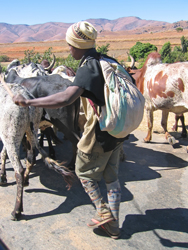Enhancing African smallholder farming productivity
The ‘Exploring tradeoffs around farming livelihoods and the environment: the AfricaNUANCES framework’ (Africanuances) project was designed to address this issue by incorporating the variances to determine best practices for achieving food security, sustainability and resilience of natural resources in Sub-Saharan Africa. The project targeted humid and semi-humid ecosystems and developed an analytical model combining spatial and temporal characteristics of smallholder farming. Specifically, the model considered crop production in relation to soil fertility as well as livestock production for various livestock systems and manure handling. Particular emphasis was given to efficient use of nutrients and to improving soil quality. In addition, the temporal characteristics were considered by including balances in feed, organic material and labour over time. Researchers evaluated the model in terms of costs and benefits, in particular as related to productivity, economics and environmental services. As such, the project represents the first instance of simulation models incorporating agro-ecological and socioeconomic parameters. In addition, the temporal characteristics of the model enabled careful analysis of the dynamic interactions between production, consumption and resource management. Although the project focused on issues of soil fertility, the results are broadly applicable to evaluation of agricultural processes. Thus, the Africanuances project contributed a modelling tool of particular importance to Sub-Saharan Africa and its critical need to increase agricultural productivity amid the inherent complexities of its smallholder farms. The information was shared with local farmers and extension workers in addition to its free availability on the website and should yield fruitful – or maybe ‘legume-full’ – results.







